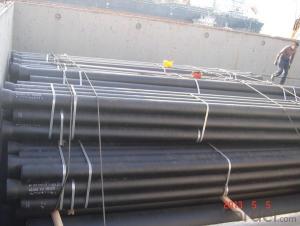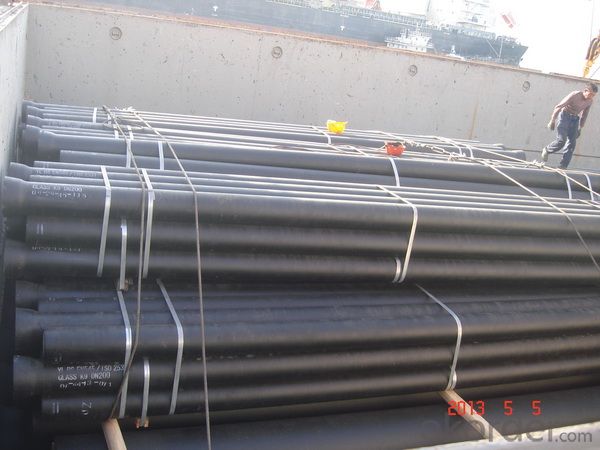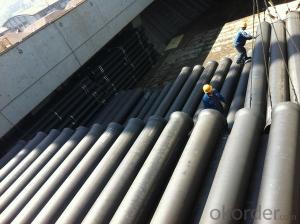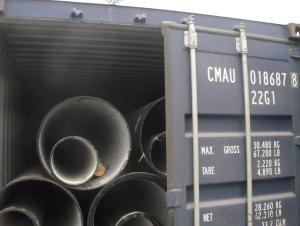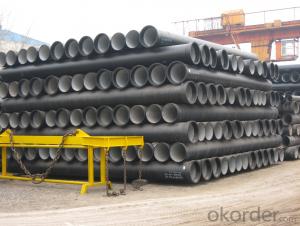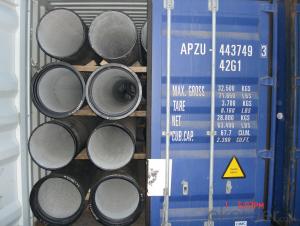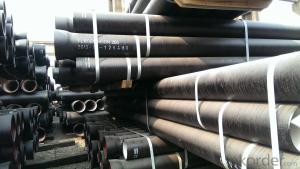K Type Ductile Iron Pipe DN400 C30 SOCKET SPIGOT PIPES
- Loading Port:
- Tianjin
- Payment Terms:
- TT OR LC
- Min Order Qty:
- 25 m.t
- Supply Capability:
- 30000 m.t/month
OKorder Service Pledge
OKorder Financial Service
You Might Also Like
1) The standard of pipe: ISO2531:1998, EN545:2006,K9 K8
2) Effective length: 6m/5.7m
3) Inner cement line: Portland cement lineas per ISO4179
4) Zinc coating: at least 130g/m2 as per ISO8179
5) Bitumen painting: at least 70μm as per ISO8179
6)With 102% quantity of NBR, SBR, or EPDM ring asper ISO4633
7) DN80-DN1200
8) Highstrength, lighter than grey iron, good corrosion resistance, no furring, smallflow resistance, easy fixing, long life tome about 100 yeas
9)Checked by automatic inspection equipment
10) Composition:
Chemical composition | |||
Chemical composition | Ductile Cast Iron Pipe (%) | Grey iron pipe (%) | Steel pipe (%) |
C | 3.5-4.0 | 3.2-3.8 | 0.1-0.2 |
Si | 1.9-2.6 | 1.4-2.2 | 0.15-0.4 |
Mn | 0.15-0.45 | 0.4-0.6 | 0.3-0.6 |
P | ≤0.06 | ≤0.3 | 0.02-0.03 |
S | ≤0.02 | ≤0.1 | 0.02-0.03 |
Mg | 0.03-0.06 |
|
|
11) Feature:
Mechanical properties | |||
| Ductile Cast Iron Pipe | Grey Iron Pipe | Steel Pipe |
Tensile Strength(Mpa) | ≥420 | 150-260 | ≥400 |
Yield Strength(Mpa) | ≥300 | No Confirmation | No Confirmation |
Bending Strength(Mpa) | ≥590 | 200-360 | ≥400 |
Elongation (%) | ≥10 | Neglected | ≥18 |
Brinell Hardness(HBS) | ≤230 | ≤230 | About 140 |
12) T type mechanical joint
13) Packing: in bulk or container
PACKING: 1) Pipesare bundled together with the steel belt.
2) Wooden pieces are put between the pipes.
- Q: Do ductile iron pipes require internal lining for potable water applications?
- Yes, ductile iron pipes do require internal lining for potable water applications. This is because the iron used in these pipes can react with the water and potentially contaminate it. Internal lining acts as a barrier between the water and the iron, preventing any chemical reactions and ensuring the water remains safe for consumption.
- Q: Are ductile iron pipes resistant to alkali attacks?
- Yes, ductile iron pipes are generally resistant to alkali attacks. The high carbon content and unique microstructure of ductile iron make it highly resistant to corrosion, including attacks from alkali substances.
- Q: What is the exterior anticorrosion of nodular cast iron pipes?
- First clean the impurity on the surface of the pipe or fitting, and then sprayed zinc treatment (130g/m and asphalt paint coating fand) not less than 70 m
- Q: What are the common methods for leak detection in ductile iron pipes?
- There are several common methods for leak detection in ductile iron pipes. These methods are widely used by professionals in the field to identify and locate leaks in a timely manner. 1. Acoustic Leak Detection: This method involves using specialized equipment to listen for the sound of water escaping from the pipe. The equipment detects the sound of the leak and helps pinpoint its location. This method is effective for both pressurized and non-pressurized pipes. 2. Visual Inspection: Visual inspection involves physically inspecting the pipe system for any visible signs of leaks such as water stains, wet spots, or puddles. This method is relatively simple and can be effective for detecting visible leaks in accessible areas. 3. Pressure Testing: Pressure testing involves pressurizing the pipe system and monitoring for any drops in pressure. If there is a leak, the pressure will drop, indicating its presence. This method is commonly used during installation or maintenance and can help identify leaks in inaccessible areas. 4. Infrared Thermography: Infrared cameras are used to detect leaks by measuring temperature differences. Water escaping from a pipe can create a temperature difference, which can be detected by the camera. This method is particularly effective for identifying hidden leaks behind walls or underground. 5. Tracer Gas Testing: Tracer gas testing involves injecting a specific gas, such as helium or hydrogen, into the pipe system. If there is a leak, the gas will escape and can be detected using specialized equipment. This method is highly sensitive and can locate even small leaks. 6. Soil Gas Monitoring: This method involves monitoring the soil around the pipe for the presence of gases emitted by leaking water. By analyzing the soil gas composition, professionals can determine the location of the leak. It is important to note that the choice of method may vary depending on the specific circumstances, such as the size of the pipe system, accessibility, and severity of the leak. In some cases, a combination of methods may be used to ensure accurate and comprehensive leak detection.
- Q: Will the cast iron pipes rust?
- Qualified ductile iron pipe requires lining standard cement. The outer wall of pipe needs spraying zinc treatment and asphalt paint coating, and other epoxy resin paint can also be selected.
- Q: Are ductile iron pipes resistant to acid mine drainage corrosion?
- Yes, ductile iron pipes are generally resistant to acid mine drainage corrosion. Their high durability, strength, and corrosion resistance make them suitable for transporting water in acidic environments, such as those affected by acid mine drainage.
- Q: Can ductile iron pipes be used for oil and gas pipelines?
- Yes, ductile iron pipes can be used for oil and gas pipelines. Ductile iron is known for its durability, strength, and corrosion resistance, making it suitable for transporting oil and gas. Its high tensile strength and ability to withstand pressure and extreme temperatures make it a reliable choice for these applications.
- Q: Method for cutting cast iron pipe
- Depends on the material and the use of requirements. Ordinary gray iron, if the incision is not strict, such as water pipes. They are all sheared with hydraulic cutting machine, but the incision will not be very smooth. If it is ductile iron, and the incision requirements are high, it can only be used plasma cutting machine. General fittings, if not specifically required, shall not be cut by machining methods.
- Q: Can ductile iron pipe be used for nuclear power plants?
- Certain applications within nuclear power plants can utilize ductile iron pipe. Ductile iron pipe is renowned for its strength, durability, and resistance to corrosion, which makes it suitable for a variety of industrial and infrastructure projects. However, when considering nuclear power plants, specific factors must be taken into account. Safety and reliability of materials used in nuclear power plants are of utmost concern. Although ductile iron pipe meets many requirements, it may not be the optimal choice for critical applications involving the transportation of radioactive fluids or the handling of high-pressure or high-temperature systems within the plant. These particular applications often necessitate materials with exceptional resistance to corrosion, stress, and radiation damage. Materials such as stainless steel, nickel alloys, or even specialized materials like Inconel are commonly employed in nuclear power plants due to their superior properties. These materials offer enhanced resistance to radiation-induced embrittlement, corrosion, and high-temperature and high-pressure conditions. Therefore, while ductile iron pipe may find utility in non-critical applications within nuclear power plants, it is crucial to consult industry experts, engineers, and adhere to relevant nuclear safety regulations in order to determine the most suitable materials for specific applications within the plant.
- Q: Can ductile iron pipes be used in areas with high levels of heavy metal contamination?
- Yes, ductile iron pipes can be used in areas with high levels of heavy metal contamination. Ductile iron pipes have a high resistance to corrosion, which makes them suitable for transporting water in such environments. Additionally, their durable nature helps prevent the release of heavy metals into the water supply, ensuring the safety and integrity of the system.
Send your message to us
K Type Ductile Iron Pipe DN400 C30 SOCKET SPIGOT PIPES
- Loading Port:
- Tianjin
- Payment Terms:
- TT OR LC
- Min Order Qty:
- 25 m.t
- Supply Capability:
- 30000 m.t/month
OKorder Service Pledge
OKorder Financial Service
Similar products
Hot products
Hot Searches
Related keywords
